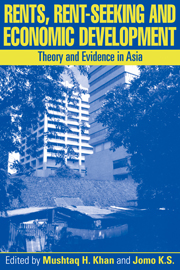Book contents
- Frontmatter
- Contents
- List of Figures
- List of Tables
- List of Contributors
- Acknowledgements
- List of Abbreviations
- Introduction
- 1 Rents, Efficiency and Growth
- 2 Rent-seeking as Process
- 3 Rent-seeking and Economic Development in Thailand
- 4 Thailand's Old Bureaucratic Polity and Its New Semi-democracy
- 5 Obstructive Corruption: The Politics of Privilege in the Philippines
- 6 Funny Money: Fiscal Policy, Rent-seeking and Economic Performance in Indonesia
- 7 The Malaysian Development Dilemma
- 8 Financial Sector Rents in Malaysia
- Index
7 - The Malaysian Development Dilemma
Published online by Cambridge University Press: 05 March 2012
- Frontmatter
- Contents
- List of Figures
- List of Tables
- List of Contributors
- Acknowledgements
- List of Abbreviations
- Introduction
- 1 Rents, Efficiency and Growth
- 2 Rent-seeking as Process
- 3 Rent-seeking and Economic Development in Thailand
- 4 Thailand's Old Bureaucratic Polity and Its New Semi-democracy
- 5 Obstructive Corruption: The Politics of Privilege in the Philippines
- 6 Funny Money: Fiscal Policy, Rent-seeking and Economic Performance in Indonesia
- 7 The Malaysian Development Dilemma
- 8 Financial Sector Rents in Malaysia
- Index
Summary
The East Asian economic crisis since mid-1997 has generated a popular neo-liberal critique of crony capitalism as its ostensible cause. The argument is that cronyistic relations, especially between the state and business interests, resulted in unsustainable gross inefficiencies which eventually culminated in improper financial and other practices, that ultimately sounded the death-knell for the East Asian economic miracle. Government intervention generally as well as state–business relations are thus blamed for precipitating the crisis. Put simply, government interventions are said to have created economic rents, thus encouraging wasteful rentseeking activity (often involving corruption) and other inefficient economic conduct, which eventually culminated in the collapse of financial systems in the region.
Public opinion in Malaysia about government intervention has often been divided along ethnic lines, especially since the early 1970s. After the ethnic riots of May 1969, the redistributive New Economic Policy, announced in 1970, sought to create the conditions for ‘national unity’ by reducing poverty as well as inter-ethnic economic disparities. Since then, the vast majority of the predominandy Muslim Malay Bumiputras (indigenes) have supported government intervention, which has become closely identified with the new policy that has largely alienated most of the mainly ethnic Chinese and Indian non-Bumiputras (non-indigenes). While many among the Indians seek more inclusive government intervention to benefit them, many Chinese – dubious of the likelihood of intervention in their favour – prefer a minimalist role for government.
- Type
- Chapter
- Information
- Rents, Rent-Seeking and Economic DevelopmentTheory and Evidence in Asia, pp. 274 - 303Publisher: Cambridge University PressPrint publication year: 2000
- 13
- Cited by



